高考英语省略句全解
高中英语省略句用法详解及练习
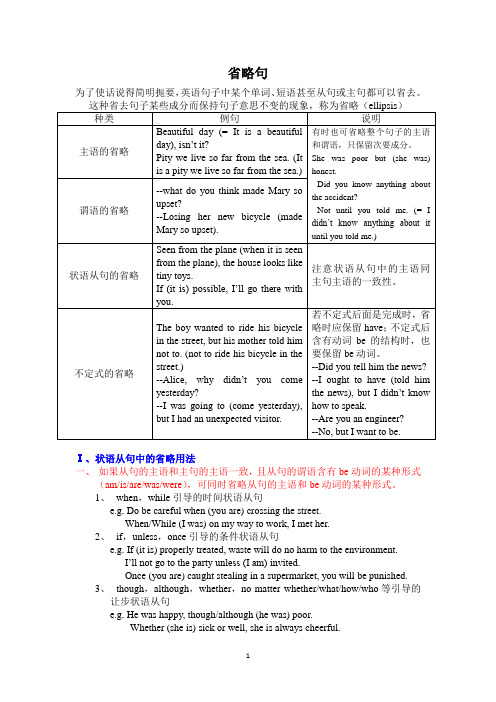
省略句为了使话说得简明扼要,英语句子中某个单词、短语甚至从句或主句都可以省去。
Ⅰ、状语从句中的省略用法一、如果从句的主语和主句的主语一致,且从句的谓语含有be动词的某种形式(am/is/are/was/were),可同时省略从句的主语和be动词的某种形式。
1、when,while引导的时间状语从句e.g. Do be careful when (you are) crossing the street.When/While (I was) on my way to work, I met her.2、if,unless,once引导的条件状语从句e.g. If (it is) properly treated, waste will do no harm to the environment.I’ll not go to the party unless (I am) invited.Once (you are) caught stealing in a supermarket, you will be punished.3、though,although,whether,no matter whether/what/how/who等引导的让步状语从句e.g. He was happy, though/although (he was) poor.Whether (she is) sick or well, she is always cheerful.No matter how/However hard the task (is), we must fulfill it in time.(注:从句的主语和主句的主语不一致时,只省略从句中的be动词形式)4、as if,as though引导的方式状语从句e.g. He rubbed his eyes and yawned as if/though (he was) waking up after along sleep.He stood up as if/though (he wanted) to leave.(as if/though + to do表示一个将来的动作)二、than,as引导的比较状语从句中的省略用法:当不同的主语进行比较时,一般省略从句中的谓语;当从句中的主语与谓语(be动词除外)和主句中的主语与谓语相同时,通常省略从句中的主语和谓语,只保留比较部分。
高中英语知识点归纳省略句的分类与用法

高中英语知识点归纳省略句的分类与用法高中英语知识点归纳——省略句的分类与用法一、省略句概述省略句,指在句子中省略掉其他成分,只保留部分成分或不保留任何成分的句子,是英语中常见的一种句子结构。
省略句的使用可以简化句子结构,提高语言的表达效果,但在实际应用中需要注意使用的准确性和合理性。
省略句的分类与用法主要包括以下几个方面:二、主语、宾语和谓语的省略1. 主语的省略在一般现在时和一般过去时的陈述句、祈使句和感叹句中,当主语是代词时,常常可以省略主语。
例如:(1) Got it.(2) Good idea!2. 宾语的省略在一些交际性较强的场合,特别是口语中,常常可以省略动词的宾语。
例如:(1) Can you lend me a pen? → Can you lend me?(2) I saw the movie last night. → I saw last night.3. 谓语的省略在上下文已经明确的情况下,可以省略谓语动词。
例如:(1) Have you finished your homework? → Yes, I have.(2) I didn't see you at the party. → No, I didn't.三、定语和状语的省略1. 定语的省略当被修饰语已经被前面提及或上下文中明确时,可以省略定语从句中的关系代词或连词。
例如:(1) The book that I borrowed from the library is very interesting. → The book I borrowed from the library is very interesting.(2) The girl who is wearing a r ed dress is my sister. → The girl wearinga red dress is my sister.2. 状语的省略在某些情况下,可以省略状语从句或状语从句中的一些成分。
高中英语知识点归纳省略句的种类与用法
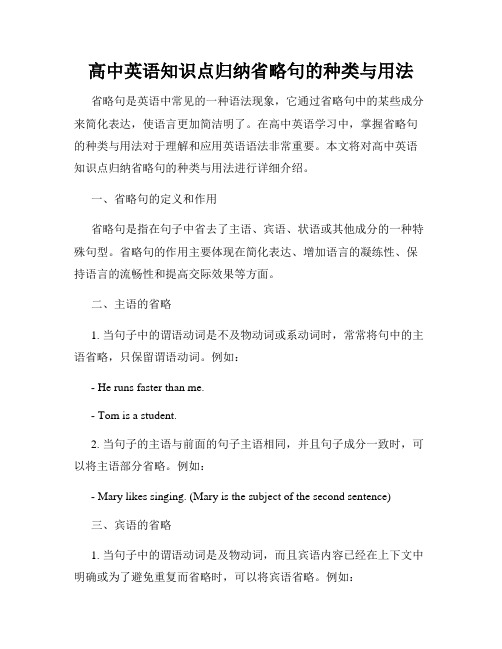
高中英语知识点归纳省略句的种类与用法省略句是英语中常见的一种语法现象,它通过省略句中的某些成分来简化表达,使语言更加简洁明了。
在高中英语学习中,掌握省略句的种类与用法对于理解和应用英语语法非常重要。
本文将对高中英语知识点归纳省略句的种类与用法进行详细介绍。
一、省略句的定义和作用省略句是指在句子中省去了主语、宾语、状语或其他成分的一种特殊句型。
省略句的作用主要体现在简化表达、增加语言的凝练性、保持语言的流畅性和提高交际效果等方面。
二、主语的省略1. 当句子中的谓语动词是不及物动词或系动词时,常常将句中的主语省略,只保留谓语动词。
例如:- He runs faster than me.- Tom is a student.2. 当句子的主语与前面的句子主语相同,并且句子成分一致时,可以将主语部分省略。
例如:- Mary likes singing. (Mary is the subject of the second sentence)三、宾语的省略1. 当句子中的谓语动词是及物动词,而且宾语内容已经在上下文中明确或为了避免重复而省略时,可以将宾语省略。
例如:- Can you speak French? Yes, I can. (French is the object of speak)四、状语的省略1. 当句子中的状语从句与主句的主语或宾语一致时,可以将状语从句中的主语或宾语省略。
例如:- He speaks English better than I (do). (I is the subject of do)- She likes swimming more than her sister (does). (Her sister is the subject of does)2. 当句子中的状语从句与主句的谓语动词一致时,可以将状语从句中的谓语动词省略。
例如:- I work harder than you (do). (Do is the verb of the subordinate clause)五、被动语态的省略1. 当句子中的被动语态中的被动助动词和be动词前面有介词时,可以将be动词和介词省略。
高考英语省略句知识点分类汇编附解析
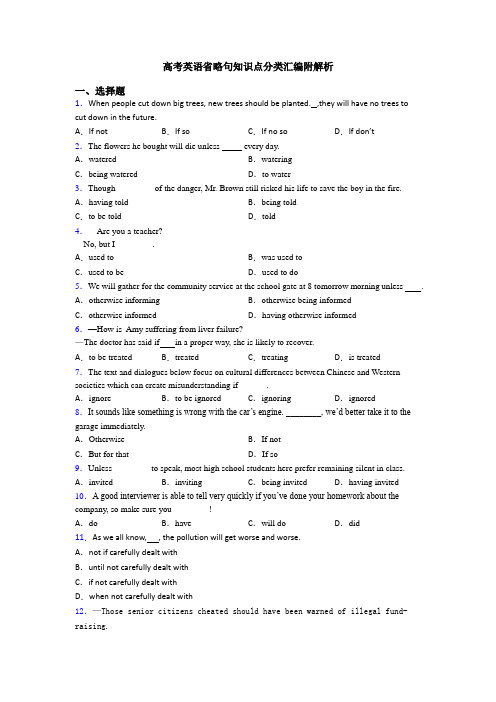
高考英语省略句知识点分类汇编附解析一、选择题1.When people cut down big trees, new trees should be planted. ,they will have no trees to cut down in the future.A.If not B.If so C.If no so D.If don’t2.The flowers he bought will die unless every day.A.watered B.wateringC.being watered D.to water3.Though ________ of the danger, Mr. Brown still risked his life to save the boy in the fire. A.having told B.being toldC.to be told D.told4.---Are you a teacher?---No, but I ________.A.used to B.was used toC.used to be D.used to do5.We will gather for the community service at the school gate at 8 tomorrow morning unless . A.otherwise informing B.otherwise being informedC.otherwise informed D.having otherwise informed6.—How is Amy suffering from liver failure?—The doctor has said if in a proper way, she is likely to recover.A.to be treated B.treated C.treating D.is treated7.The text and dialogues below focus on cultural differences between Chinese and Western societies which can create misunderstanding if ______.A.ignore B.to be ignored C.ignoring D.ignored8.It sounds like something is wrong with the car’s engine. ________, we’d better take it to the garage immediately.A.Otherwise B.If notC.But for that D.If so9.Unless ________ to speak, most high school students here prefer remaining silent in class. A.invited B.inviting C.being invited D.having invited 10.A good interviewer is able to tell very quickly if you’ve done your homework about the company, so make sure you ________!A.do B.have C.will do D.did11.As we all know, , the pollution will get worse and worse.A.not if carefully dealt withB.until not carefully dealt withC.if not carefully dealt withD.when not carefully dealt with12.—Those senior citizens cheated should have been warned of illegal fund-raising.—________. But few could resist the temptation.A.They were B.They shouldC.They must D.They did13.Although not as such, those large-scale military exercises with America were partly aimed at scaring the North Korea.A.being advertised B.advertisingC.having advertised D.advertised14.He is only too ready to help others, seldom, ____, refusing them when they turn to him. A.if never B.if ever C.if not D.if any 15.Unless______, this law will make life difficult for farmers.A.changed B.changingC.being changed D.is changing16.Experts have found that the disease will lead to a greater increase in the number of sufferers unless________seriously when the symptom first appears.A.treated B.to be treatedC.being treated D.be treated17."Talking with others in the real world always me embarrassed and my heart beats quickly. I never dare to look in anyone’s eyes when ," the 22-year-old said, describing her anxiety. A.make; speaking B.makes; speakingC.makes; speak D.make; speak18.—What’s your dream?—Well, my parents wouldn’t expect me to be a banker, but I still .A.hope to B.hope so C.hope not D.hope for 19.This golden opportunity _____ your full attention although ________ to seize.A.worthy of; is hard B.worth; being hardC.is worthy; it hard D.is worth; hard20.---How is the man injured in the earthquake?---The doctor said if _________ in a proper way, he was likely to be saved.A.treated B.treatingC.is treated D.to be treated21.There are some health problems that, when ____in time, can become bigger ones later on. A.not treated B.not being treatedC.not to be treated D.not having been treated22.The cloth ______easily if _______on a table.A.measures, spreading B.will be measured, spread C.measures, spread D.is measured, spread23.Once _______ in the forest, we should remain ________ we are and wait for help. A.losing; there B.losing; where C.lost; there D.lost; where 24.Though _______ by her classmates, the little girl didn’t burst into tears or be in despair. A.leaving out B.left outC.being left out D.leave out25.—Should I look up the new words each time I come across some?—No, refer to your dictionary only ______.A.where possible B.when necessary C.if ever D.if so【参考答案】***试卷处理标记,请不要删除一、选择题1.A解析:A【解析】试题分析:A;考查省略句。
高考英语省略知识点总结
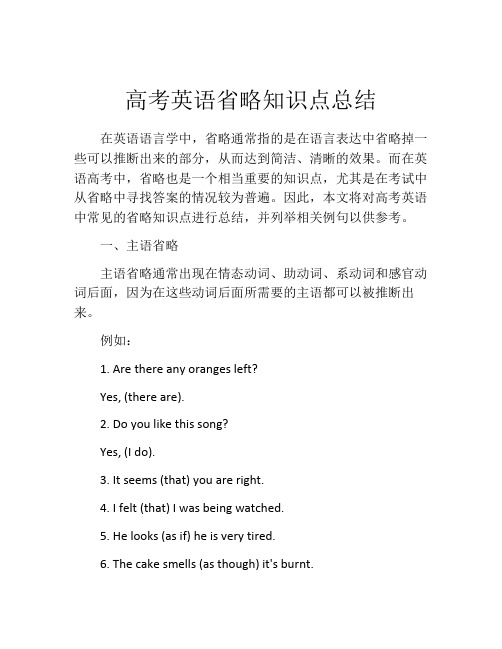
高考英语省略知识点总结在英语语言学中,省略通常指的是在语言表达中省略掉一些可以推断出来的部分,从而达到简洁、清晰的效果。
而在英语高考中,省略也是一个相当重要的知识点,尤其是在考试中从省略中寻找答案的情况较为普遍。
因此,本文将对高考英语中常见的省略知识点进行总结,并列举相关例句以供参考。
一、主语省略主语省略通常出现在情态动词、助动词、系动词和感官动词后面,因为在这些动词后面所需要的主语都可以被推断出来。
例如:1. Are there any oranges left?Yes, (there are).2. Do you like this song?Yes, (I do).3. It seems (that) you are right.4. I felt (that) I was being watched.5. He looks (as if) he is very tired.6. The cake smells (as though) it's burnt.二、宾语省略宾语省略通常出现在动宾结构中,即有一个及物动词和需要一个宾语的情况下,这个宾语可以被省略掉。
例如:1. He enjoys (playing) basketball.2. Would you like (some) tea?3. They considered (him) to be the best candidate.4. I saw (a man) run across the road.三、介词省略介词省略通常指省略掉可以在上下文中推断出来的介词。
此外,在固定短语中,常用的介词也可以被省略掉。
例如:1. I am (going) to the supermarket.2. She arrived (at) the airport at 2 p.m.3. He excels (in) mathematics.4. I'm interested (in) Chinese culture.四、代词省略代词省略通常出现在上下文中出现了相应的代词的情况下,可以省略掉相应的代词。
省略句高考英语
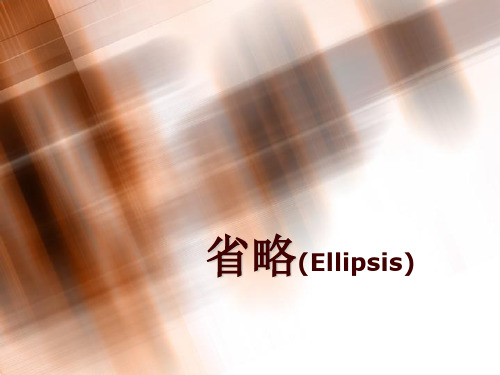
--- You should have thanked her before you left. --- I meant ________, but when I was leaving I couldn't find her anywhere. A. to do B. to B C. doing D. doing it
8
四 状语从句中的省略 1)当状语从句中的主语和主句的主语一致,或状 语从句中的主语是it,并且又含有be动词时,常 可以省略从句中的主语和be动词:
9
> He did as (he was) told. > Though (they were) tired, they went on working. > You shouldn't come to his party unless (you are) invited. > He paused as if (he was) expecting her to speak. > When (it is) necessary, I will turn to you for help.
11
2. Generally speaking, ________according to directions, the drug has no side effect. A. when taking B. B when taken C. when to take D. when to be taken
省略(Ellipsis)
省略(Ellipsis)
作用:
>避免结构上或内容上的重复,使上下文紧
密连接;
>语法的客观要求,句子中的一个或几个成
(word完整版)高考英语省略句考点全归纳,推荐文档
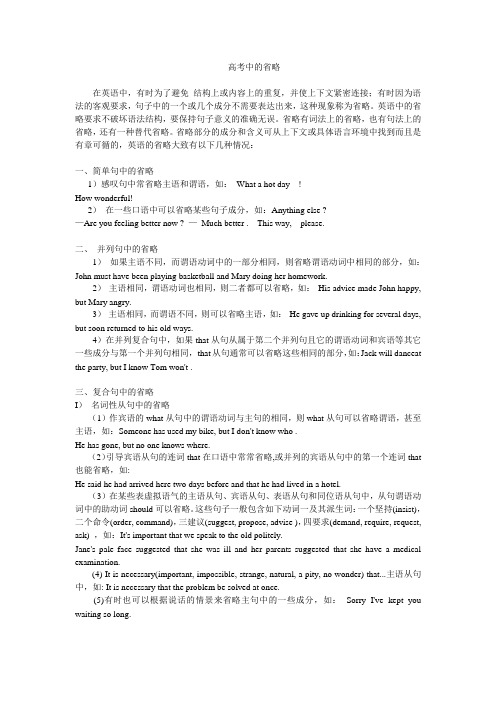
高考中的省略在英语中,有时为了避免结构上或内容上的重复,并使上下文紧密连接;有时因为语法的客观要求,句子中的一个或几个成分不需要表达出来,这种现象称为省略。
英语中的省略要求不破坏语法结构,要保持句子意义的准确无误。
省略有词法上的省略,也有句法上的省略,还有一种替代省略。
省略部分的成分和含义可从上下文或具体语言环境中找到而且是有章可循的,英语的省略大致有以下几种情况:一、简单句中的省略1)感叹句中常省略主语和谓语,如:What a hot day !How wonderful!2)在一些口语中可以省略某些句子成分,如:Anything else ?—Are you feeling better now ? —Much better . This way, please.二、并列句中的省略1)如果主语不同,而谓语动词中的一部分相同,则省略谓语动词中相同的部分,如:John must have been playing basketball and Mary doing her homework.2)主语相同,谓语动词也相同,则二者都可以省略,如:His advice made John happy, but Mary angry.3)主语相同,而谓语不同,则可以省略主语,如:He gave up drinking for several days, but soon returned to his old ways.4)在并列复合句中,如果that从句从属于第二个并列句且它的谓语动词和宾语等其它一些成分与第一个并列句相同,that从句通常可以省略这些相同的部分,如:Jack will danceat the party, but I know Tom won't .三、复合句中的省略I)名词性从句中的省略(1)作宾语的what从句中的谓语动词与主句的相同,则what从句可以省略谓语,甚至主语,如:Someone has used my bike, but I don't know who .He has gone, but no one knows where.(2)引导宾语从句的连词that在口语中常常省略,或并列的宾语从句中的第一个连词that 也能省略,如:He said he had arrived here two days before and that he had lived in a hotel.(3)在某些表虚拟语气的主语从句、宾语从句、表语从句和同位语从句中,从句谓语动词中的助动词should可以省略。
高考英语省略句解析

高考英语省略句解析省略是英语语法中的一个重要现象,尤其在高考英语中经常会出现省略句。
省略句的出现不仅能够简化句子结构,使语言更加简练流畅,还有助于提高语言的表达效果。
本文将详细解析高考英语中常见的省略句,帮助考生更好地理解和应对这一题型。
1. 省略主语省略主语是英语中最常见的省略形式之一。
当主语在上文中已经明确指代或暗示时,可以在下文中省略主语,使句子结构简洁明了。
例如:原句:Tom is good at playing basketball. He often wins the game.省略主语:Tom is good at playing basketball. Often wins the game.2. 省略谓语谓语的省略在高考英语中也较为常见。
当句子的主语为it, this, that, these, those等指示代词时,常常可以省略谓语动词,简化句子结构。
例如:原句:He knows a lot about computers, but I don't know.省略谓语:He knows a lot about computers, but I don't.3. 省略宾语宾语的省略是一种语言表达的简化方式。
当句子中的宾语是人称代词时,常常可以省略宾语,使句子更加简洁。
例如:原句:I saw him yesterday, but he didn't see me.省略宾语:I saw him yesterday, but he didn't see.4. 省略定语从句定语从句的省略在高考英语中也颇为常见。
当定语从句的主语和谓语与主句中的一致时,可以将定语从句中的主语和谓语省略,只保留从句中的关系词和其他修饰成分。
例如:原句:The book that I borrowed from the library yesterday is very interesting.省略定语从句:The book I borrowed from the library yesterday is very interesting.5. 省略介词短语在高考英语中,介词短语的省略也是一种常见现象。
- 1、下载文档前请自行甄别文档内容的完整性,平台不提供额外的编辑、内容补充、找答案等附加服务。
- 2、"仅部分预览"的文档,不可在线预览部分如存在完整性等问题,可反馈申请退款(可完整预览的文档不适用该条件!)。
- 3、如文档侵犯您的权益,请联系客服反馈,我们会尽快为您处理(人工客服工作时间:9:00-18:30)。
词法上的省略名词所有格后修饰的名词在以下情况可以省略①如果名词所有格修饰的名词在前文已出现,则可以省略。
②名词所有格后修饰的名词如果是指商店、住宅等地点时,这些名词也常常省略。
These are John's books and those are Mary's (books).这些是约翰的书,那些是玛丽的书。
at the doctor's 在诊所 at Mr. Green's 在格林先生家to my uncle's 到我叔叔家 at the barber's 在理发店冠词的省略①为了避免重复②在副词的最高级前面的定冠词常可以省略。
③在某些独立主格结构中。
④在as引导的让步状语从句中,当作表语的单数名词提前时,不定冠词要省略。
①The lightning flashed and thunder crashed.电闪雷鸣。
(thunder前省略了定冠词the)②She sings best in the class.她在班上唱歌唱得最好。
③Our teacher came in, book in hand.(=Our teacher came in, with a book in his hand.)我们的老师手里拿着一本书进来了。
④Child as he is, he knows a lot.虽然他还是一个孩子,却懂得很多介词的省略①both 后常跟of短语,其后可以接名词复数形式,也可以接代词宾格复数形式。
接复数名词时,介词of可以省略,但接代词宾格时,of不能省略。
②在现在完成时表持续和重复的句型中,一段时间前的介词for可以省略。
③和一些动词搭配构成的短语中的介词,consider... (as)..., prevent / stop...(from)doing...,have trouble / difficulty... (in) doing...,spend... (in / on) doing... 等中的介词可以省略。
①Both (of) the films were interesting. 这两部电影都很有趣。
She invited both of us to her birthday party.她邀请我们俩去参加她的生日派对。
②These shoes are worn out. They have lasted (for) a long time.这双鞋穿破了,已经穿了很长一段时间了。
③Trees can prevent the earth (from) being washed away.树能阻止泥土被冲走。
Can you stop him (from) going swimming in the river?你能阻止他下河洗澡吗?I have some difficulty (in) answering the question.回答这个问题我有点困难。
①有些动词,believe, find, think, feel, consider, imagine, prove等后作宾补的结构。
to be + n. / adj.中的to be可以省略。
②感官动词see, hear, feel, watch, notice 等以及使役动词let, make, have后作宾补的动词不定式,其中的不定式符号to要省略,但变为被动结构时,to必须保留。
③在can not but, can not choose but, can not help but之后的动词不定式一般不带to;but 之前有实义动词do的某个形式do, does, did, done 时,也不带to, 否则要带to。
④在并列结构中为了避免重复。
⑤在why, why not 引导的特殊问句中后跟省略to的动词不定式。
⑥动词不定式中动词原形部分是否省略,主要看句子前面是否已出现过同样的动词。
如果句子前面出现过同样的动词,为了避免重复,句子后面的不定式常省略动词原形,而保留不定式符号to。
①I consider him (to be) lazy.我认为他懒。
His mother found him (to be) a clever boy.他母亲发觉他是一个很聪明的孩子。
②They made the boy go to bed early.他们强迫这个男孩早睡。
The boy was made to go to bed early. 这个男孩被迫早睡。
注:help后作宾补的动词不定式中的to可以省略也可保留。
③We have nothing to do now but wait.我们现在除了等没有别的事可做。
I can not but admire his courage. 我不能不钦佩他的勇敢。
He has no choice but to accept the fact.除了接受这个事实他别无选择。
④I'm really puzzled what to think or say.我真不知道该怎么想,怎么说才好。
但两个不定式有对照或对比的意义时,则后一个to不能省。
I came not to scold but to praise you.我来不是责备你,而是赞美你。
⑤Why talk so much about it?为什么大谈这个事呢?Why not try it again? 为什么不再试一试呢?⑥They may go if they wish to(go).如果他们想去,他们就可以去。
Don't go till I tell you to.直到我告诉你去,你才可以去。
在一些动词afford, agree, expect, forget, mean, pretend, remember, want, refuse, hope, wish, would like (love), try等后跟动词不定式作宾语,不定式中的to可以承前(后)省略。
—Will you go to the cinema with me?你愿和我一起去看电影吗?—Well, I'd like to (go with you). 我愿意。
I would do it for you, but I don't know how to (do it for you).我想为你做这事,但我又不知如何做。
在某些形容词,afraid, glad, willing, happy, eager等后承前省略动词原形,只保留不定式符号to。
—Will you join us in the game?你愿和我们一起做这个游戏吗?—Sure, I'll be glad to(join you in the game). 当然,我愿意。
有些动词,tell, ask, allow, expect, force, invite, permit, persuade, order, warn, wish, would like,forbid等后跟动词不定式作宾语补足语、主语补足语时,不定式承前省略动词原形,保留动词不定式符号to。
He didn't come, though we had invited him to (come).尽管我们邀请他来,他却没来。
注:承前省略的动词不定式如果有助动词have或be,则要保留be或have。
—Are you a teacher? 你是老师吗?—No, but I used to be (a teacher).不,我以前是。
句法上的省略简单句中的省略①感叹句中常省略主语和谓语。
②在一些口语中可以省略某些句子成分。
①What a hot day (it is)!多热的天啊!How wonderful!多妙啊!②—(Will you)Have a smoke?你抽烟吗?—No.Thanks.不,谢谢了。
(Is there)Anything else to say?还有别的要说吗?并列句中的省略①如果主语不同,而谓语动词中的一部分相同,则省略谓语动词中相同的那部分。
②主语相同,谓语动词也相同,则二者都可以省略。
③主语相同,而谓语不同,则可以省略主语。
④在并列复合句中,如果that从句从属于第二个并列句且它的谓语动词和宾语等其它一些成分与第一个并列句相同时,这个that从句通常可以省略这些相同的部分。
①John must have been playing football and Mary (must have been) doing her homework.约翰一定在踢球,而玛丽一定在做作业。
②His suggestions made John happy, but (his suggestions made) Mary angry.他的建议使约翰高兴,却使玛丽很生气。
③Old McDonald gave up smoking for a while, but (he) soon returned to his old ways.老麦克唐纳戒了一阵子烟,可很快又抽上了。
④Jack will sing at the party, but I know John won't (sing at the party).杰克将在晚会上唱歌,但我知道约翰不会在晚会上唱歌。
复合句中的省略▲名词性从句中的省略①作宾语的what从句中的谓语动词与主句的相同,则what从句可以省略谓语,甚至主语②有时候也可以根据说话的情景来省略主句中的一些成分。
③在某些表虚拟语气的主语从句、宾语从句、表语从句和同位语从句中,从句谓语动词中的助动词should可以省略。
▲定语从句中的省略①在限制性定语从句中,作宾语的关系代词that, which, who (whom)常可以省略。
②关系副词when, where, why以及that在the time(day, morning, afternoon, evening, night, week,month, year等) when, the place(desk, table, room, spot, house, town, country, school等)where, the reason why, the way that结构中引导限制性定语从句时,在非正式场合下,可以省略关系副词when, where, why, that。
▲状语从句中的省略当状语从句中的主语和主句的主语一致,或状语从句中的主语是it,并且又含有be 动词时,常可以省略从句中的主语和be动词。
